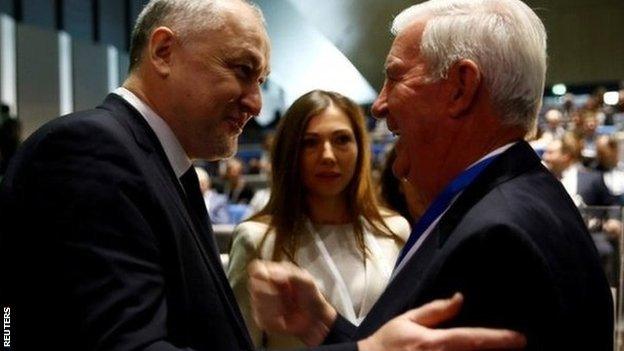Russian doping: Russia set to miss end-of-year Wada deadline
- Published

Rusada director general Yuri Ganus with Wada president Sir Craig Reedie
Russia is set to miss Monday's end-of-year deadline to hand over data from its Moscow anti-doping laboratory.
The World Anti-Doping Agency (Wada) controversially lifted a three-year ban on the country in September on the strict condition samples were sent by 31 December.
But senior Wada officials now privately accept the deadline will lapse.
Last week, Wada admitted its inspection team had been denied full access to the Moscow samples.
Wada's experts have yet to return to Russia.
Russia's anti-doping agency (Rusada) appealed to President Vladimir Putin to help break the impasse, but the country is now at serious risk of being banned once again from international events following a state-sponsored doping scandal.
Wada's Compliance Review Committee meets on 14 January in Montreal, Canada and will be under intense pressure to recommend another suspension to the global watchdog's executive committee.
The news will also be highly embarrassing for Wada's leadership, which was heavily criticised by athletes and national anti-doping agencies when Rusada was reinstated three months ago.
On 15 November, Wada President Sir Craig Reedie said he was "confident" Russia would meet the deadline.
"I find it very hard to believe that the guarantees made to us by the Russian authorities - that they won't deliver," he said.
How the scandal unfolded
December 2014: As many as 99% of Russian athletes are guilty of doping, a German TV documentary alleges.
November 2015: A Wada commission publishes an independent report alleging widespread corruption, amounting to state-sponsored doping in Russian track and field athletics. Rusada is declared non-compliant.
May 2016: Former Moscow anti-doping laboratory boss Grigory Rodchenkov,, external who has turned whistleblower, says dozens of Russian athletes at the 2014 Winter Olympics in Sochi had cheated.
July 2016: Russia operated a state-sponsored doping programme for four years across the "vast majority" of summer and winter Olympic sports, says a report from Professor Richard McLaren.
August 2016: International Olympic Committee (IOC) decides against imposing a blanket ban on Russian athletes at the 2016 Olympics in Rio. Individual sporting federations rule instead, with 271 Russians competing.
December 2016: Wada publishes the second part of the McLaren report which says more than 1,000 Russian athletes benefited from doping.
January 2017: Rusada and Russian sport authorities given list of criteria, external to achieve before winning back recognition.
March 2017: Wada says Russia's anti-doping reforms are not happening quickly enough.
February 2018: Russia are banned from competing at 2018 Winter Olympics in South Korea by the IOC, but 169 athletes who prove they are clean allowed to compete under a neutral flag.
May 2018: Wada writes to Rusada offering 'compromise' solution.
September 2018: News of the compromise, revealed by the BBC, prompts fury from athletes and doping bodies.